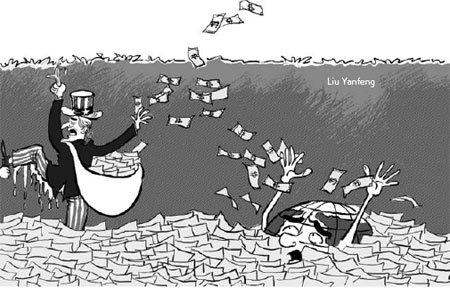
|
BIZCHINA> Review & Analysis
 |
|
Phantom of stagflation could be back
By Ding Yifan (China Daily)
Updated: 2009-06-23 07:52 The international market is seeing an unusual phenomenon: prices of commodity futures have surged because of an almost 30 percent rise in oil prices in May and, except for the price of Treasury bonds, the US securities market has risen sharply. Actually, the global economic crisis should have pushed down the prices of commodity futures. So why has the opposite happened without an economic recovery? The market seems to reflect the worry of investors that the extremely loose monetary and extravagant fiscal policies of the US will lead to inflation in the near future. They have begun investing in commodity futures and financial products, including mortgage-backed securities, in order to fend off investment risks and prevent losses if inflation sets in. We should remember that the economic crisis started with subprime mortgage. So any sign of inflation would stimulate investors to resume their interest in mortgages. But does that help the resurgence of the real estate market and conform to the policies of the US government? Several analysts say that because of staggering public and private debts, US consumers have little choice but to pinch the spending to pay off debts. But how could overindulgent Americans, used to consumption through borrowing, accept this agonizing reality?
Besides, the most important effect of inflation is that US debts, which are dollar-denominated, will evaporate partly through the devaluation of the dollar. This is the most alluring reason why the US government is not likely to fight inflation now. A few analysts of the American securities market say the US could even see a double-digit inflation. That helps us to better understand the disputes between the US and the European Union (EU) on how to deal with the crisis, which became public in the run-up to the April G20 summit in London. The US criticized the Europeans for being too cautious to stimulate their economies through increased public spending, saying it could aggravate the crisis and even lead to depression. The Europeans argued that the world could not borrow its way out of the crisis, which was created by excessive borrowing in the first place. The US-Europe dispute has its roots in their different historical experiences and economic status. The core of the EU economy is Germany, which was traumatized by the hyperinflation during the Weimar Republic. After the end of World War II, the Germans learned a lesson, and transformed their monetary system and stridently opposed inflation. The strong deutsche mark soon became the core currency of Europe. The American experience is totally different. The worst US economic trauma was the Great Depression in the 1930s. The Federal Reserve then stuck to gold standard and did not loosen the monetary policy in time, and thus helped turn a recession into depression. The present Fed chairman Ben Bernanke earned his PhD with a thesis on the Fed blunder during the Great Depression. Thus it is not surprising to see him try to avoid repeating the mistake by pumping out abundant money supply to counter the recession. The difference in their economic and social models is another factor why the US and EU countries are trying to cope with the crisis differently. The economic growth of European countries is closely related to exports of manufacturing products, especially machinery. Dropping exports have stifled the European economy whenever the demand for manufacturing products has fallen. But since the EU countries have a sound social safety net and generous unemployment benefits, recession has not yet hit consumption on the continent. Contrary to what happened during earlier recessions, domestic consumption has even grown in many EU countries this year. The Europeans believe that the crisis can have some positive effects because it could sweep away uncompetitive firms and industries. Since the EU is not going to bail out its firms, they have no choice but to become more competitive through technological innovation. If the other countries increase their public spending, new markets will be created, and the European economy could depend on its competitive advantage to share the growth and export its way out of the recession. The circumstances in the US are rather different. Wages in the US are higher than in Europe, but its social safety net is weaker. When American workers lose their jobs, they lose a big percentage of their consumption capacity, too, triggering a vicious cycle and exacerbating recession. Thus, the US has to actively increase public investment to stimulate the economy and create jobs. The Fed is supposedly ignoring the looming pressure of inflation because it thinks the US economy is now threatened by deflation, the bane of corporate investment and economic recovery. Hence the sign of a bit of inflation is not bad news. And even if hyperinflation sets in, the Fed has enough ways to absorb the excessive fluidity and curb it. It does not seem to be a very convincing excuse, however. The recent rally of the futures market indicates the worry of investors that inflation is imminent. If investors fear the US government will dilute its debts with inflation, the interest rates for future debts will soar. If interest rates in the money market surge and investment costs balloon, how could the US emerge out of the recession? If the recession is not down and inflation is back, the nightmare of the 1970s' stagflation might return to haunt the global economy. The author is a researcher with the Development and Research Center under the State Council.
 (For more biz stories, please visit Industries)
|